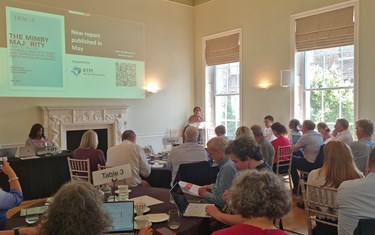 Standing on the stage at One Great George Street for her Inauguration in mid-January, Sue Bridge outlined key themes that will go on to define her year as President of the RTPI. She spoke of the shared ambition that all planners have to create great places, the climate emergency, and launched one of the key assets to her Presidency, the RTPI’s new wellbeing helpline.
Standing on the stage at One Great George Street for her Inauguration in mid-January, Sue Bridge outlined key themes that will go on to define her year as President of the RTPI. She spoke of the shared ambition that all planners have to create great places, the climate emergency, and launched one of the key assets to her Presidency, the RTPI’s new wellbeing helpline.
The helpline, which is available to all members, has come as a response to concerning data discovered in the Royal Town Planning Institute Cyrmu’s report, The Big Conversation. Using data from the Institute’s survey of over 200 planners in Wales, RTPI Cyrmu found that over three-quarters of planners in Wales are overstretched in their work, with the majority of respondents reporting an increase in their workload and remit in the past two years.
Working within these conditions is taking its toll on the profession, particularly in Local Planning Authorities, which had a 15% rate of respondents looking to move out of the profession.
There is little doubt that the mounting workload is a leading contributing factor to this concerning figure. In September, our report showed that local authority net expenditure on planning has fallen by 43% since 2009. This amounts to just 0.45% of local government budgets allocated to planning services in England. We can see that the public sector is under-resourced and understaffed, resulting in delays, underperformance and stress, with many local authority planners left questioning what they signed up for.
By collaborating with the Institute’s magazine, The Planner, we will be asking the same question of wellbeing to our members across the UK and Ireland. You can help us to build that understanding by completing the survey here.
Setting new professional standards
Today, on February 1st, the RTPI is proud to be launching its updated Code of Professional Conduct, a new set of requirements for all members to follow.
These include a requirement to base professional advice on appropriate evidence and without improper manipulation; a need to apply a reasonable standard of skill, knowledge and care to all work; and a clearer requirement to comply with the existing CPD requirements.
The Code has also been fully updated and existing supplementary regulations have been embedded within it. The new Code can be found on the Code of Professional Conduct page.
Planning for tomorrow
Late last year, we launched a series of videos called Planning For Tomorrow’s Environment to show how, through an effective and insightful planning system, we can reduce carbon emissions and adapt to climate change impacts already locked in.
We will continue this project tomorrow with our first Planning for Tomorrow’s Environment podcast. The series will focus on improving urban greening, protecting biodiversity, creating affordable housing and improving wellbeing through healthy placemaking. If you enjoy it, keep an eye out every Thursday for the next five weeks as we roll the series out.
Help shape planning reform
We have already begun our NPPF policy roundtables, the series of discussions that we are undertaking to help inform our work on the NPPF. If you’ve not yet done so, we strongly encourage RTPI members to lend us your thoughts at an upcoming roundtable.
Ministers and parliamentarians take RTPI members’ experiences, views and expectations seriously. Your views are fundamental to the RTPI’s work steering the course of planning reform and safeguarding delivery on the ground.
Find out more about how you can get involved in your local roundtable and discover more about the NPPF by following the link here.


